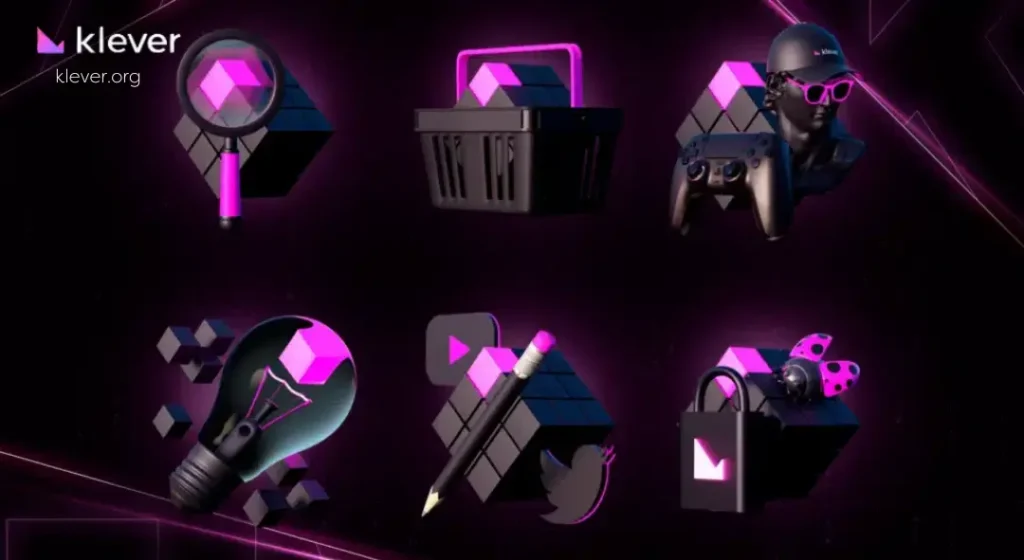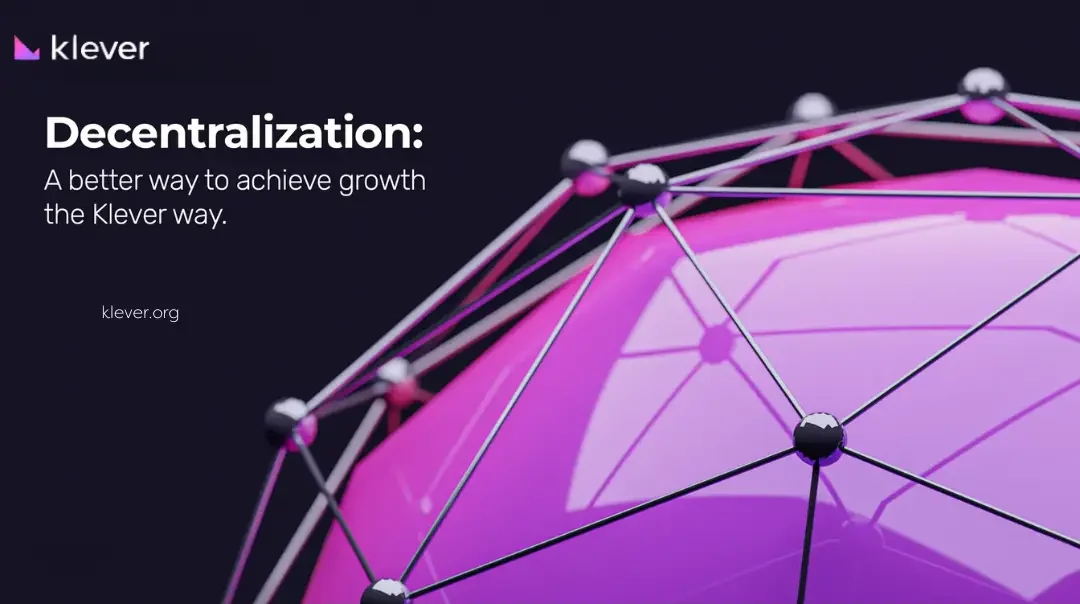
Table of Contents
Imagine a world where no single entity has control, where transparency and security are paramount. This is the promise of decentralization, a key principle transforming the digital landscape through blockchain technology. Unlike traditional systems, decentralization distributes power and data across a network of computers, ensuring every transaction is transparent, secure, and tamper-proof.
In this guide, we’ll explore how decentralization works, its importance in blockchain, and why it matters for the future. Learn how this transformative approach, exemplified by platforms like KleverChain, offers unparalleled advantages for various applications.
Understanding decentralization

What is decentralization?
Decentralization transfers power from a single central authority to a wider, distributed network. In the world of blockchain This means spreading data and control across many computers, called nodes, instead of relying on a central entity. Each node has an identical copy of the blockchain, and updates require agreement from the entire network. This decentralized approach contrasts with centralized systems where one entity controls everything and can make changes at will.
By removing the central authority, decentralization increases security, transparency and trust, making the blockchain robust against attacks, fraud and censorship, like KleverChain, a user-friendly low-code blockchain platform designed to make blockchain development accessible to all.
The importance of decentralization in Blockchain
The decentralized resource that the blockchain offers brings several advantages. Firstly, if there is a pipe figure in the centralized model, hackers only need to break one entity. Doing the same for several nodes proves to be logistically impossible and therefore increases security by design. Secondly, is that decentralization guarantees transparency by keeping all transactions recorded in a public ledger accessible to everyone on the network, making it less prone to corruption because the system is open. Thirdly, decentralization promotes trust. As no single entity has control over the blockchain, users can trust that the data is accurate and tamper-proof. This trust is particularly important in financial transactions, where transparency and integrity are paramount. Overall, decentralization makes blockchain technology a secure, transparent and reliable system, suitable for various applications in different sectors.
Decentralization in Blockchain Technology
Blockchain technology operates on a peer-to-peer network where each participant, or node, keeps an identical copy of the ledger. In this case, all transactions are openly verified and codified by everyone involved, guaranteeing a high level of transparency. Where traditional systems rely on trust in a central party for validation, with blockchain it’s more the crowd that does, which makes this technology more democratic and also harder to censor. A blockchain network is made up of nodes that cooperate to verify and record transactions using consensus models such as Proof of Work (PoW) or Proof of Stake (PoS).
PoW involves solving complex mathematical puzzles, which requires significant computing power, ensuring that only compromised nodes can validate transactions. Proof of Stake (PoS), on the other hand, makes it possible to define which nodes can encode valid transactions as a function of how many coins they hold – and voluntarily put into staking by means of collateral. Both forms mean that all nodes will agree on which transactions.
The decentralized ledger and the distributed consensus mechanism it uses offer a number of benefits. Firstly, they can do this by creating a secure data set that malicious actors will find impossible to hack or alter. Secondly, they bring transparency by ensuring that each transaction is observable for the entire spectrum of network participants. Thirdly, they reduce the need for intermediaries, which can help reduce costs and definitely speed up processes. All features helps it to revolutionize sectors, right from finance tok supply-chain offering a transparent & secure way in handling data and transaction.
Impact of decentralization on Blockchain

Decentralization in blockchain technology offers significant advantages by distributing control among several nodes. This structure increases security, as changing data requires majority control of the network, making it highly resistant to tampering. Furthermore, a transparency is improved with all transactions recorded in a public ledger accessible to all participants. In addition, decentralization eliminates the need for intermediaries, speeding up processes and reducing costs. These benefits make blockchain an ideal solution for various sectors, promoting a more secure, transparent and efficient way of managing data and transactions.
Improved security
One of the advantages that blockchain decentralization provides is increased security. The main reason that data breaches and unauthorized access happens is due to having a single point of failure in traditional centralized systems. On the other hand, a decentralized blockchain network distributes data to several nodes, which makes it very difficult for any third party or attacker to modify or alter data. Each transaction is confirmed by several nodes to ensure its accuracy. Therefore, modifying data requires more than 50% of the nodes in the network to agree, making it practically impossible. The unique distributed ledger system makes this almost foolproof against hackers or fraud, as it removes a weak central node . In addition, the cryptographic techniques used in blockchain further increase security by encrypting data and ensuring that only authorized participants can access and verify transactions. In general, decentralization significantly strengthens the security of blockchain networks making them a reliable and trustworthy solution for various applications.
Increased transparency
Decentralization also significantly increases transparency within the blockchain network. In a centralized system, a single entity controls the data, and participants must trust it to act honestly. But, as with any decentralized blockchain, each transaction is published on a public ledger visible to anyone who has joined the network. This openness has the benefit of making all transactions visible and verifiable, thus minimizing corruption by keeping everyone accountable. The transparent nature of a decentralized blockchain network guarantees trust between users, who can verify data independently. Decentralized networks also don’t require third parties to get started, which means that the last thing a blockchain needs is more intermediation and therefore potential sources of bias or manipulation. This high level of transparency is crucial in sectors such as financial services, supply chain management and healthcare, where trust and traceability are essential. Decentralization is what guarantees the integrity and credibility of the blockchain through transparent and unaltered records.
Decentralization is a fundamental aspect of blockchain technology that offers numerous benefits, including improved security and increased transparency. By leveraging a decentralized ledger and a distributed consensus mechanism, blockchain technology guarantees a more secure, transparent and reliable system. This makes it an ideal solution for various applications in different sectors, from finance to supply chain management. Understanding the importance of decentralization in blockchain can help individuals and organizations appreciate the potential of this revolutionary technology.
Explore Klever Chain today and become part of the future of blockchain.
